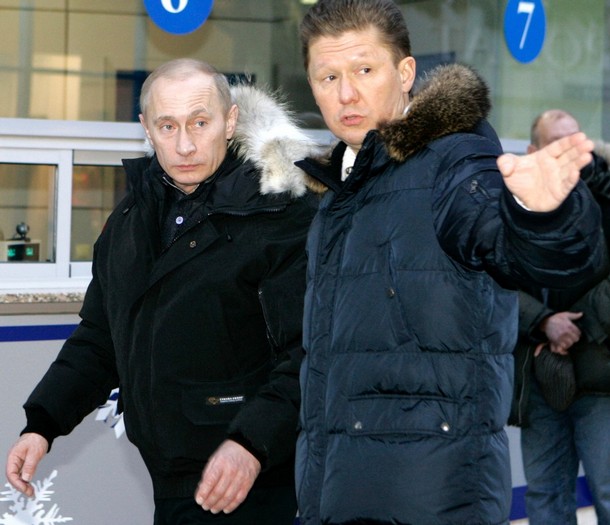
A War Like No Other: Putin Mishandles Another Gas Conflict
Publication: Eurasia Daily Monitor Volume: 6 Issue: 6
By:

Two weeks after the traditional turn of the valve in the first minute of the new year, the disagreement between Russia and Ukraine over the trade and transit of natural gas is still not resolved, and it is not only the duration that makes this “gas war” different from the previous quarrels. At the outset of the active phase of conflict, the inescapable feeling of déjà vu prevailed in commentaries and risk assessments by the concerned parties. It took a week for the EU to wake up to the need to take urgent measures. The first reaction was to issue a statement that the interruption of deliveries was “completely unacceptable,” which had no effect whatsoever. The idea about international monitoring of the gas flow proposed by German Chancellor Angela Merkel on January 7 took another week to materialize, despite the technical simplicity of such control; but the resumption of Russian exports to Europe has not facilitated a deal on deliveries to Ukraine. Without this key part of the problem being resolved, the situation remains unstable (RIA-Novosti, www.newsru.com, Kommersant, December 11).
It is not only the EU that has been caught by surprise with the intensity of this “war,” which has already inflicted significant damage to the economies of Bulgaria, Greece, Slovakia, and several other countries that had no gas reserves. Gazprom has also encountered a crisis of far greater proportions than it had expected, and the comments of its executives that they had “no rational explanations for Ukraine’s behavior” in this “absolutely abnormal situation” betrayed confusion and a lack of planning for such an escalation (Moscow echo, January 7). Gazprom’s CEO Alexei Miller and his deputies rushed to Brussels and other European capitals seeking to explain their position, and Prime Minister Vladimir Putin held an extraordinary press conference for foreign journalists in order to present a coherent version of the messy squabble (RIA-Novosti, January 8). These move have hardly helped to minimize the damage to Gazprom’s reputation, and it is already possible to identify a number of serious Russian mistakes in managing this crisis.
One group of mistakes has to do directly with Ukraine, which shocked Moscow by walking out of the nearly completed negotiations on December 31 and showing no interest in resuming them for a week after. Putin had believed that the never-ending row between President Viktor Yushchenko and Prime Minister Yulia Tymoshenko would prevent the Ukrainian leadership from making any proactive steps, but he did not recognize how desperate Yushchenko was to improve his hopeless position for the presidential elections in January 2010. Gazprom was firm and set to extract a price from Naftohaz at least a third higher than in 2008, since it had committed itself to pay “European” prices to the Central Asian producers. It failed to grasp, however, the consequences of the fact that Ukraine to all intents and purposes was bankrupt and the “compromise” price of $250 was far beyond the country’s means. Kiev is beyond worrying about “reputation damage,” hence its bold decision to let Europe freeze (Moscow echo, January 7; Vedomosti, January 11).
Here lies another set of Russia’s miscalculations that involve European reaction and responses. Gazprom assumed that its position was rock solid and that it would be clear for the European consumers where the blame belonged. Putin believed that his relentless efforts at clarifying the content of the 2006 “gas skirmish” would bear fruit so that the European leaders would not listen to the predictable choir of commentary about Russia’s “imperial ambitions” and “gas blackmail.” He misunderstood, however, that despite all the irritation about the political mess in Kiev, for the Europeans Ukraine remained a democratic country that deserved a measure of support. He also failed to see how deeply the August war with Georgia had undermined trust between Russia and the EU, despite the resumption of dialogue. The key point for Putin was that Germany, his “gravity center” in European politics, was not affected by the gas cuts; but he did not expect the very even-handed mediation by the Czechs who hold the rotating EU presidency (Moscow echo, January 10).
European criticism of Russia’s inflexible behavior, unpleasant as it was, has not changed the basic assumption in Moscow that Russia simply cannot lose this “gas war.” Tactically, this confidence stems from the reality that Europe is highly vulnerable to interruptions in the gas flow, while Russia has huge reserves of cash and can therefore ignore the delays in the flow of money. Strategically, this asymmetric dependence is strengthened by the nearly certain proposition that Europe, whatever dreams about “diversification” it might entertain, has no alternative to Russian gas, since the Caspian production is largely booked by Gazprom and the nontraditional sources of energy are unviable in the time of crisis. Although Putin and Miller keep repeating the thesis that the “epoch of cheap gas is over,” they have been perfectly aware that with the nine-month lag following the collapse of oil prices, the benchmark European price is scheduled to drop from the current peak above $500 per 1000 cubic meters to below $200 in the second half of the year (RIA-Novosti, November 12; www.gazeta.ru, January 11). It appears plausible that Russia aims to revisie the old formula that connects oil and gas prices and replace it with a Soviet-style calculation based on rising production costs.
Putin never admits mistakes and will certainly insist that the tough line taken against Ukraine’s cheating and bluffing has given Russia a “victory.” Public opinion, however, would hardly be much impressed with this seasonal brawl, particularly as the end of the long holidays marks the start of layoffs and bankruptcies (Ezhednevny zhurnal, January 11). Nor would Europe relax about its energy supplies, as Gazprom has further built on its reputation as an irresponsible bully whose favorite business methods are arm-twisting and hostage-taking. Waging a “gas war” against the background of a deepening crisis, Russia has pushed itself further into international isolation and has fooled itself, maybe for the last time, that it can make the neighbors respect it. Putin has delivered unsteady and blundering leadership, Medvedev was demonstratively irrelevant in conducting this war, and the notion of “stability-of-prosperity” that remains the core value of their regime has evaporated.




